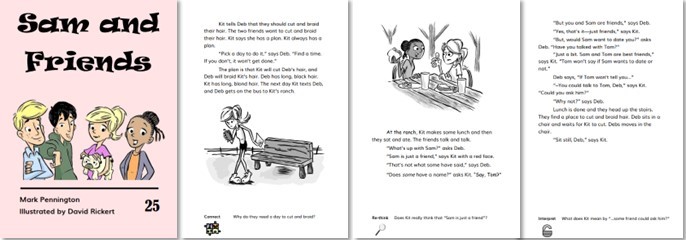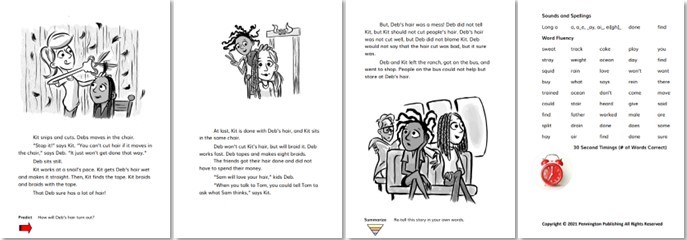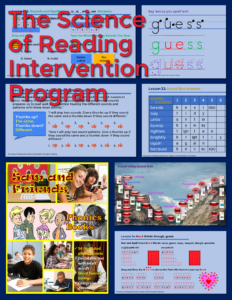UFLI Resources for Older Students
What instructional resources do teachers need to supplement UFLI for Older Students? Many intermediate and upper elementary, middle school, high school, and adult literacy teachers, who are using the UFLI (University of Florida Literacy Institute) Foundations program for reading intervention, are searching for UFLI resources for older students.
UFLI Foundations (usually referred to by teachers as “UFLI”) was designed, field-tested, and studied as a core K-2 program. The program has quickly become the go-to structured literacy program for science of reading-oriented teachers. The scripted directions, free cost (except for the $70 teachers manual), and supplemental teacher and parent resources make UFLI a near-perfect program selection for K-2 Tier 1 instruction. I would use it. However, for older students, teachers need to supplement.
Big disclaimer. I am the chief author and publisher of The Science of Reading Intervention Program, which has been specifically developed for older readers, ages 8-adult in reading intervention, ELL, MLL, SPED, and adult literacy.
Reasons Teachers Need to Supplement UFLI Lessons for Older Students
Reason #1. The UFLI decodable passages are not age-appropriate. According to the UFLI website, “UFLI is intended for core instruction for students in Kindergarten- 2nd grade and intervention for 3rd grade and up. It may be used for whole group tier 1 instruction, small groups, tier 2 and 3 instruction or all of the above.” https://ufli.education.ufl.edu/foundations/
I asked Dr. Holly Lane, UFLI director, in a FB group post whether the Foundations program is appropriate for older intervention students, and she answered, “If they don’t know it, they need what UFLI provides.”
I certainly agree that if students don’t know the reading basics, they need to learn them. However, how they learn the reading basics matters.
For example, let’s take a look at a UFLI decodable passage. This passage introduces the long /a/ “ai” and “ay” spellings to correspond with Lesson 84. The “a_e” sound-spelling is introduced in Lesson 54.
Sunday Fun
On Sundays, Gail visits her brother at his farm. Gail loves to go to the farm because there is so much to do. She starts the day in the garden. If it did not rain, she sprays the plants with water.
Then, Gail and her brother walk on the trail from the garden to the pond. As they walk, Gail hunts for snail shells. When she finds shells, she tucks them in her pocket. She will paint them when she gets home.
At the pond, her brother likes to fish. He strings bait onto his fishing pole and waits for a bite. While they wait, Gail plays in the mud and clay.
At the end of the day, they walk back up the trail to go home. As they walk, they see the sun set and the day fade away.
© 2022 University of Florida Literacy Institute https://ufli.education.ufl.edu/wp-content/uploads/2022/08/84_Decodable_UFLIFoundations.pdf
*****
Let’s compare the UFLI long /a/ passage to my Sam and Friends Phonics Books decodable. Notice the additional practice, word fluency, and comprehension supports to introduce the long /a/ “a,” “a_e,” “_ay,” “_ai,””eigh” spellings.


© 2021 Pennington Publishing View all 54 Sam and Friends Phonics Books here (the above jpg it too hard to read): https://penningtonpublishing.com/collections/reading/products/the-science-of-reading-intervention-program-bundle
Which lesson resource is more age-appropriate for, say a fourth or seventh grader in your reading intervention class? Simply put, older students who struggle with reading are fundamentally different than beginning readers. I’ve read through much of the UFLI manual and some corresponding decodables and they, fortunately, are not too babyish. However, the characters, plots, and themes do not deal with the interests of older students. In particular, the urban and ELL students I and many other teachers work with. Teachers may wish to check out all 54 Sam and Friends Phonics Books. Print, tablet, and phone formats. Preview every single book to see how these age-appropriate decodables will match the needs and interests of older readers.
Reason #2. UFLI is a word recognition program only. Older students need the upper strand of Scarborough’s Rope, as well: Language Comprehension. Since the UFLI lessons are only 30 minutes each with a recommended pace of two lessons per week, most teachers supplement with other programs. Teachers may wish to check out The Science of Reading Intervention Program: Language Comprehension to supplement UFLI for older students.
- Background Knowledge: Mentor text bell ringers
- Vocabulary Worksheets: Academic language, Greek and Latin morphology, figures of speech, connotations, multiple meaning words with the Diagnostic Academic Language Placement Assessment.
- Syntax in Reading
- Reading Comprehension: Strategies and expository animal articles, composed in tiered grades 1-7 levels with inferential questions
- Literacy Knowledge: Narrative and expository genre and text structure
- Greek and Latin Morphology: Guided lessons with anchor words
- Executive Function and Study Skills
*****
But why supplement UFLI Foundations, when you can purchase the comprehensive reading intervention, specifically designed for older readers? Mark Pennington is the author of The Science of Reading Intervention Program–a full year word recognition and language comprehension program for ages-adult. Preview the entire program in the product description. Also, click the link to view a real-time video of a complete sample lesson.